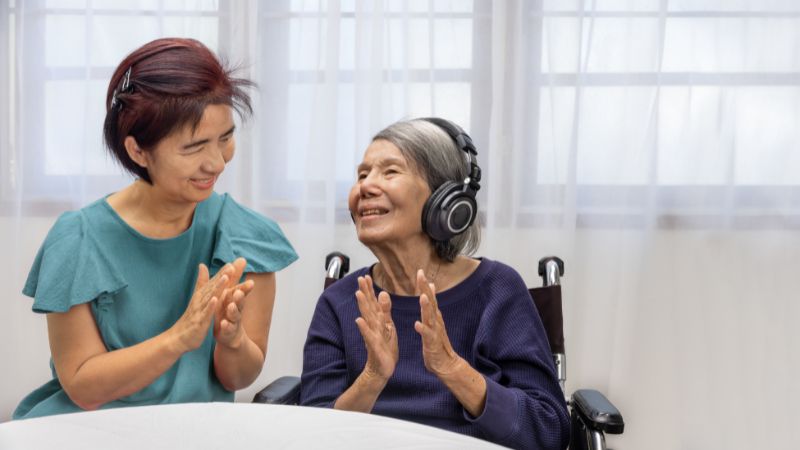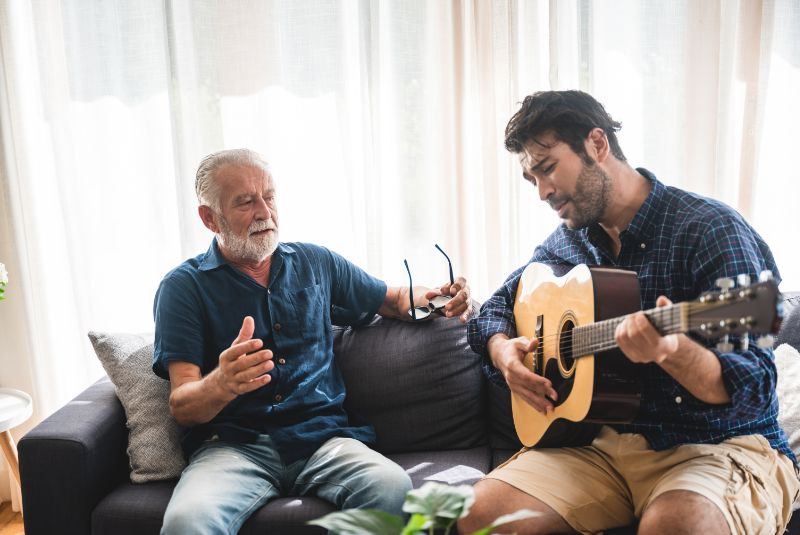
Dementia is a broad category of conditions that affect a person’s ability to learn, remember, make decisions, and communicate. It is a progressive disease that gets worse over time. There is no cure for dementia, but it can be slowed and managed with home care in Montgomery County, PA.
Recent studies show music therapy can help decrease dementia symptoms. It facilitates communication, stirs memory, and reduces dementia-related depression and anxiety. This article will discuss the relationship between music therapy and dementia and explain how a caregiver in Montgomery County, PA, can help your loved one.
What is Music Therapy?
Music therapy involves using music to promote relaxation, communication, and happiness. Sessions can include music listening and appreciation. Patients can actively participate by playing music.
How Does Music Therapy Help with Dementia?
Music therapy improves neuroplasticity. It is responsible for changes and growth in the brain’s network. Music processing occurs in various regions of the brain. Its vast reach helps seniors improve memory, retention, and other cognitive functions.
Memory is like a file cabinet in the brain where memories are stored. A person with dementia will have difficulty accessing their memories and creating new memories. Musical sounds can unlock musical memories, opening pathways for retention and communication.
Music also stimulates feel-good chemicals in the brain, like dopamine, serotonin, and oxytocin. It improves a person’s emotional state. The boost in mood reduces anxiety and depression and helps with memory loss.
What Does a Music Therapy Session Involve?
Here are the best practices for conducting a successful music therapy session.
- Determine the type of music the person will find enjoyable or let them choose.
- Choose music with no commercial interruptions, as they can confuse the individual.
- Use music that creates the desired mood. Choose soothing music to promote tranquility. Choose upbeat music to promote happiness.
- Encourage the individual to clap or dance to make the experience more enjoyable.
- Minimize competing noise to avoid sensory overload. Shut off the TV, and close doors and windows before you begin your session.
Professional therapists focus on three categories in music therapy sessions: cognition, sensorimotor, and language and speech.
They will start with upbeat music that stimulates alertness and responsiveness. Next, the therapist will address the part of the brain responsible for sensorimotor tasks by encouraging body movement.
They will also integrate Vocal Intonation Therapy (VIT). They will encourage patients to sing to promote language skills. They may ask the patient to sing to the song, or they may ask them to sing their name and address. This technique opens dementia-blocked pathways.

How a Caregiver in Montgomery County PA Can Help
You don’t need to take your loved one to sessions to benefit from music therapy. Home Care Montgomery County, PA can provide this service. Our caregivers specialize in Alzheimer’s and dementia care. They will expose your loved one to music and provide other treatments and services that boost their well-being.
Contact Family Cares to learn more about our services. It’s the best move your family can make.




